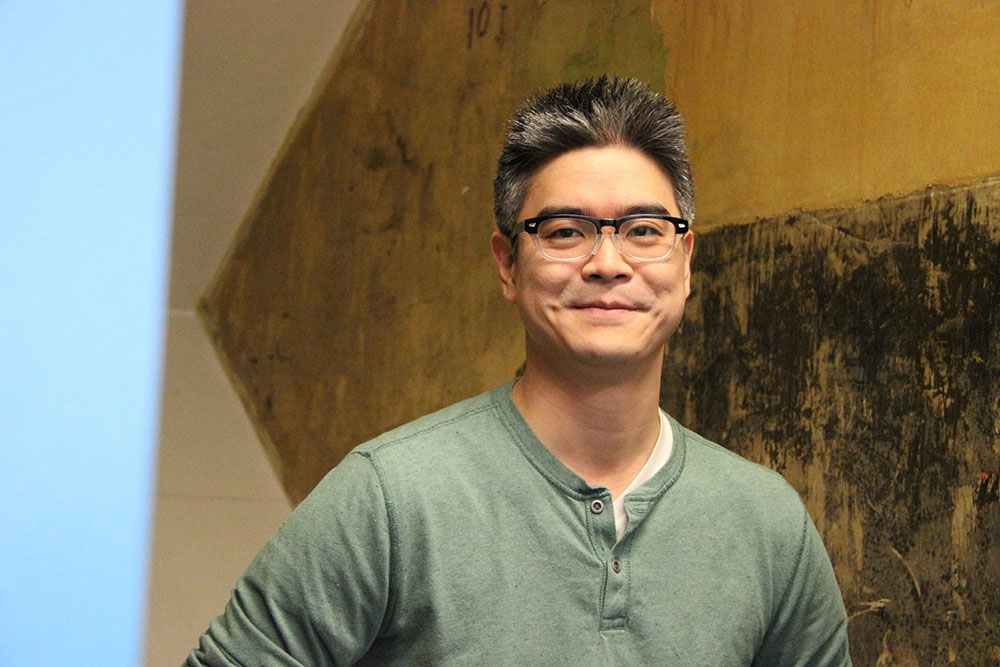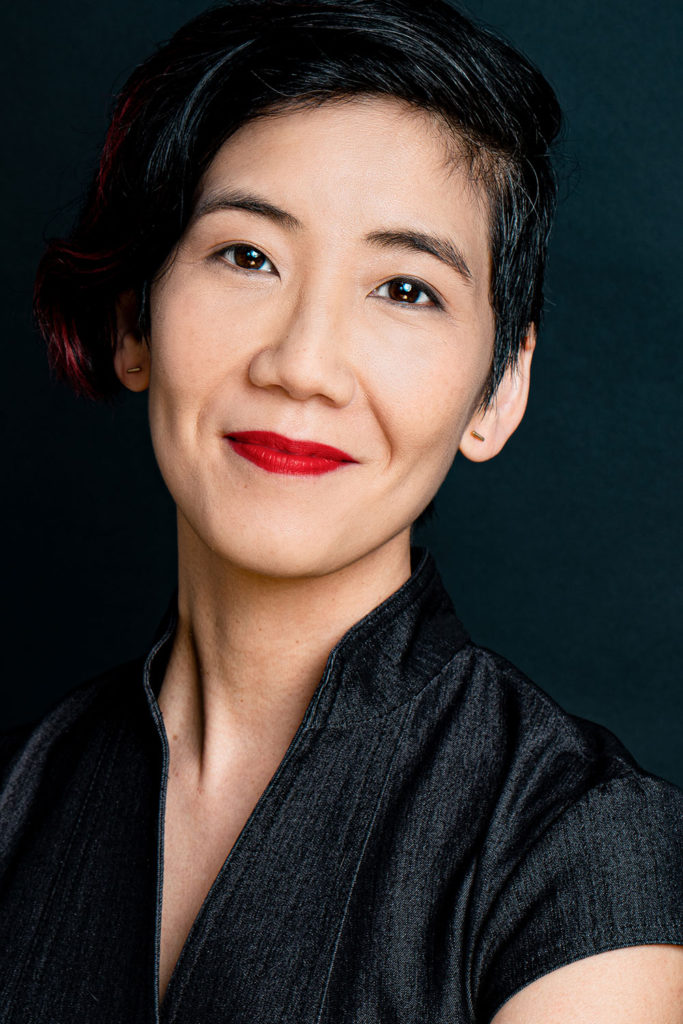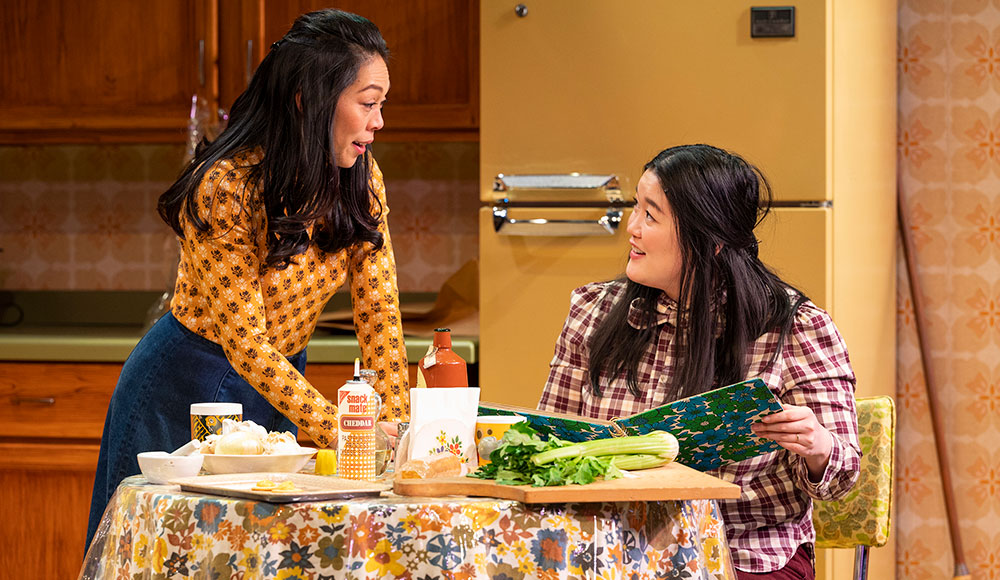Two strangers encounter each other in a grocery store as they’re shopping for Thanksgiving meals. Both recent Asian immigrants—one from the Philippines, the other from South Korea—they soon discover that they have many common experiences.
Jane and Luna are both adjusting to life in the United States during the turbulent 1970s, and to marriages in which their husbands are busy at work. They continue their conversation over a turkey dinner and wine as they share stories of their personal journeys and their new lives in America.
Created by playwright Lloyd Suh, these two characters at the core of The Heart Sellers—staged April 2–27 by TheatreWorks Silicon Valley—explore the intimacies of friendship and the broader shape of American history.
Part of Jane and Luna’s journey is to answer the question: How do you find solidarity? Suh believes that question is “the American experiment. It’s a far more interesting goal than just feeling solidarity with people who are already the same as you.” For him, solidarity is “not just an aspirational part of the American identity, but the fabric itself.”
Immigrants’ Tales
When Suh began work on The Heart Sellers, it was after he had spent “a full decade about pivotal moments in Asian American history.” Near the end of 2019, he was working with Milwaukee Rep on The Chinese Lady, a play he had written a year earlier, based on the true story of Afong Moy, a 14-year old brought from the Guangzhou Province to the United States in 1834.
The young woman—likely the first-ever Chinese person to come to the States—was put on display and promoted as a curiosity. That play examined a serious topic—racism in the U.S.—but did so in a manner skillfully suffused with humor.
He had known the director, May Adrales, for years. “But we had never been in a room together on a full-length play process,” Suh says. The two began to discuss their shared interests—and family histories. Their mothers “both came to the United States around the same time—the early 1970s—and what struck me were the ways that their experiences were very similar, and very different,” Suh explains.
A few months after that exchange, the world went into Covid lockdown. “So now I had this play to write, in isolation,” Suh recalls.
At the same time, he was already developing yet another work, The Far Country, centered around the aftermath of the Chinese Exclusion Act of 1882. “The Act was a piece of legislation that would be responsible for much of what Asian America looks like today,” he says. “It created the economic, social and even geographic conditions that dictated where we are now.”
In his work on that play, Suh was reminded that another “bookend” piece of legislation—the Hart-Celler Act, also known as the Immigration and Nationality Act of 1965—helped make his own mother’s immigration to the U.S. possible. The act established a preference system based on skills and family ties, and made it easier for non-Europeans to come to the U.S. Over time, the Hart-Celler Act helped change the United States’ demographic makeup, increasing the Asian American segment of the population sixfold in less than 40 years.
The landmark legislation provided a hook upon which to hang Suh’s new play—hence the name The Heart Sellers. He would essentially be developing two plays at once. “It was a very intense experience to be in 1882 and 1973 and think about the entire continuum,” Suh says. “But those periods of overlap tend to be pretty fruitful for me; I like the conversations that my plays might be having with each other.”
Family Lore
Suh says that initially he drew story elements for The Heart Sellers from his own family lore, “conversations I’d had with my mother, even specific things she said to me,” which helped form what he calls the play’s “emotional scaffolding.” But Suh says that he took great pains not to make The Heart Sellers the story of his mother.
The playwright explains that he had two reasons for that decision. One, he was concerned that basing the play directly on his mother’s experiences would have led him to “worry about the wrong things,” about getting specific bits of personal history right. Moreover, Suh wanted to write a play that all audiences could relate to.
Because the immigrant experience is truly the American experience, the themes at the center of The Heart Sellers resonate with audiences from most any background. “I found a lot of value and humor out of the fact that while these two characters have a lot of similarities, they have just as many differences,” Suh says. Much of the play’s action centers around each character “trying to find solidarity with somebody who’s different than them.”
Nicole Javier and Narea Kang, the two actors in the TheatreWorks production, have starred in multiple productions of The Heart Sellers, including the Milwaukee Rep run in early 2023. Based on those performances, the play won the 2024 Harold and Mimi Steinberg/American Theatre Critics Association’s New Play Award, bestowed upon the most outstanding script premiering in a professional production outside of New York City.
Friendship Amid Uncertainty
From the beginning, Suh sensed that The Heart Sellers would develop as a two-woman play. “If something happened [in the story] that made a third or a fourth character want to emerge, I was open to that,” he admits. “But it never happened. Once these two got going, they didn’t want anybody else around for awhile. They needed this time together.”
Need is a central theme in Suh’s play. Jane and Luna display “an urgent need for the emotional healing that comes from making a friend,” Suh says. “And I’ve always felt that would translate.”


In recent years, anti-immigrant sentiment has been simmering and growing up to the present, a time when the highest elected official in the land regularly spews xenophobic rhetoric. When he first conceived The Heart Sellers, Lloyd Suh didn’t set out to write a play that would feel quite so relevant. To some extent, he was driven by the isolation and certainty of the lockdown era. He felt that the very act of writing a play was aspirational—the faith that one day theater would exist again.
Yet The Heart Sellers “was also informed by the national reckoning around race that was happening during that time,” Suh says. He could only guess what a post-lockdown world would be like, but that was the audience for whom he was writing.
In some ways, the political instability of today is not wholly unlike the turmoil of the early to middle 1970s, the era in which The Heart Sellers takes place. Suh notes that Jane and Luna are navigating around political instability in the Philippines and South Korea, Richard Nixon, Watergate and the war in Vietnam. “There’s a feeling that the world is on fire,” he says, “that one can’t feel safe when imagining the future.” Those feelings are portable, he suggests. “The feelings are as real in November 1973 as they are in March 2025.”
Suh mentions that a recent staging of The Heart Sellers took place in Minneapolis in December, right around the time that newly reelected South Korean President Yoon Suk Yeol declared martial law. And in the Philippines, relatives of former dictator Ferdinand Marcos are in power. “There’s something very tangible about all of that,” he says. “There are lines in the play where one character notes that it’s a hard time in the Philippines, a hard time in Korea. And then one of them says, ‘Well, here in America…’ and the other replies, ‘…It’s a hard time, too.’”
Suh acknowledges that for the actors in The Heart Sellers, current events inevitably inform their portrayals. “You’re going to bring the news of the world in with you,” he says. “But the audience is going to do that, too.”
Suh says that as was the case with his play The Chinese Lady, it wasn’t especially challenging to work humor into The Heart Sellers. “I thought at first that it might be,” he admits. But as Suh got to know the characters he had created, he realized that Jane and Luna “want to make each other laugh,” he says. He says that the humor in the play came out of the characters themselves, “like it comes out of people themselves.”
Setting the play eight years after the Hart-Celler act went into effect was a deliberate choice. “One,” Suh explains, “it aligns with the experience of my family.” But perhaps more importantly, 1973 represents an especially volatile period. “I find it fascinating to think of people coming from counties that were then considered among the most politically unstable in the world,” he says. “They came to America, and all of their peers were like, ‘Ohh…that’s stable.’” And then as soon as they arrive, the president is like, ‘I’ve got to resign.’”
West Coast Productions
Suh observes that The Heart Sellers feels a bit different in each city where it plays. While its themes are universal, the play might resonate somewhat differently when staged in an area like the Silicon Valley, where the per capita Asian population is eight times that of Milwaukee. “But,” he emphasizes, in either case “it can also feel very local.”
Somewhat unusually, The Heart Sellers was performed in three Northern California markets: Sacramento’s Capital Stage last year, by Aurora Theatre Company in Berkeley in February, and finally by TheatreWorks Silicon Valley. Asked how a coordinated schedule of that magnitude came together, Suh smiles. “Through the pure force of will and visionary leadership of [TheatreWorks artistic director] Giovanna Sardelli,” he says.
“Multiple theaters in the same region were interested in the rights,” Suh continues. “And rather than say, ‘Oh, the biggest one gets it,’ Giovanna suggested, ‘Let’s everybody do it!’ And then they all worked it out.”
“TheatreWorks could have taken the rights to the play, which would have prevented the Aurora and Capital Stage from bringing the play to their audiences,” Sardelli explains. “It felt like it was too important, too timely, and too wonderful of a story to squash, so we embarked on this grand experiment.” But she admits that doing so did present challenges, “especially for the creative team and the production department. Our spaces are all very different, and that has meant different designs and a different way of telling the story in each theater.”
She says that the impulse to share the story with as many people as possible helped keep all involved focused on the task at hand. “It’s been wonderful to work with both theaters,” Sardelli says, “and I’m sure we’ll find ways to collaborate in the future.”
Directorial Perspective
Jennifer Chang, who directed The Heart Sellers’ world premiere at the Milwaukee Rep, reprises that role for the West Coast productions. She says that while she and Suh hadn’t worked together prior to this play, they were in “overlapping social-artistic circles” for a long time. Chang was recommended to Suh by a mutual friend and creative associate, San Francisco-born playwright Lauren Yee.
Chang would work with Suh soon again after the Milwaukee Rep premiere. In March and April 2024, she directed the West Coast premiere of The Far Country, the play Suh was writing concurrently with The Heart Sellers. The Far Country was recently nominated in no less than ten categories by the San Francisco Bay Area Theatre Critics Circle’s Excellence in Theatre Awards.
Beyond her extensive directorial credits, Chang has a personal connection that makes her the ideal person to work on The Heart Sellers. “My family immigrated in the mid ’70s,” she says. “So we are direct beneficiaries of the Hart-Celler Act, which gave preference to reunifying families, to people who—like my uncle—had served in the U.S. military.”
Chang explains that with the creation of Medicare in 1965, the United States experienced an increased need for medical professionals. The terms of the Hart-Celler Act helped fill that need. Chang’s mother was and is a nurse, and that fact worked in the family’s favor as well. “So The Heart Sellers is not exactly my family’s story,” she says, “but it is my family’s story.”


Chang says she was drawn to the play for another reason as well. “I have a deep love of [Anton] Chekhov and of Chekhovian plays,” she says. “A Chekhov play can seemingly be about nothing, but in fact is about so much. It’s about everything: culture, the sociopolitical climate, the economy and class warfare.” Chang delights in what she sees as Chekhovian characteristics in Suh’s The Heart Sellers. “It’s so much about the acting, and about really digging in and crafting the performances,” she says.
For The Heart Sellers, Chang says that her direction seeks to convey what she sees as Suh’s stylistic aspirations. The characters, she notes, are not native English speakers. “They’re speaking with accents,” she says, “but they’re expressing themselves eloquently” in a way that audiences can understand. “That’s the service we’re doing for their stories.”
Chang agrees that while The Heart Sellers is deeply rooted in one part of the Asian American experience, it’s a universal story with a much wider relevance. During the play’s run in Milwaukee—a city with a large Polish American population—she encountered many theatergoers sharing reactions like, “This is my mother’s story,” and “This is my grandmother’s story.” Audiences recognize the play’s message that we’re all similar in many ways, yet we all have important differences. Chang says that’s part of the beauty of Suh’s new play. “I think his activism with The Heart Sellers is to demonstrate that not all Asian people are the same,” she says.
“To be able to see your story unfold in front of you—told for you, not to you—is a powerful thing,” says Chang. Commenting on what she sees as the play’s cinema verité qualities, she observes that when watching The Heart Sellers, audiences often feel that they’re eavesdropping on a very real and private conversation. “It’s a safe space,” she says. “And that’s not always a place that Asian Americans in an audience feel that they see represented on stage.”
Chang concurs with Lloyd Suh’s assertion that friendship is at the core of The Heart Sellers. She sees the play’s central question as this: “What can these women do in a world ruled by powerful men doing horrible things to the countries they came from and to the country they’re in?” The answer, she believes, is to form friendships. Jane and Luna demonstrate that, she says. “They’re showing us how to make a friend. And in real life, we’re going to need each other as we move forward.”
The ‘Accounting of America’
Some playwrights hold specific ideas regarding the reaction they hope their work will elicit. Lloyd Suh says that his thoughts on that matter have evolved over time. “If I were to try to dictate, ‘Feel this’ or ‘Feel that,’ I’m denying them something personal; I’m prescribing the audience something as a group,” he says. “As much as I talk about The Heart Sellers being portable across time and place, I want it to be portable across people, too.”
Ultimately, Suh hopes that each audience member who sees The Heart Sellers will experience a personal reaction. “I’d like it if people felt, ‘Oh, that reminds me of somebody in my own family,’ or that it made them think about their own experiences, of times they felt lonely.”
For Suh, The Heart Sellers is less about helping audiences understand the immigrant experience that it is to encourage them to appreciate what he calls “the accounting of America, and understanding what friendship and solidarity mean.” History is a continuum, he suggests. “What’s important is the personal resonance.”
TheatreWorks Silicon Valley’s production of The Heart Sellers runs Apr 2–27 at Mountain View Center for the Performing Arts. Tickets: $34-$94. theatreworks.org



